

[DA LEGGERE] Le radici del progressismo cattolico nell’era della secolarizzazione: una riflessione di Augusto del Noce. A Tyranny without Tyrants? REVIEW ESSAYThe Tyranny of Merit:What’s Become of the Common Good?
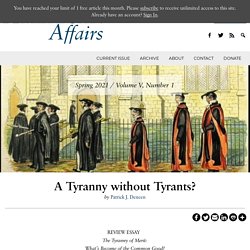
By Michael J. SandelFarrar, Straus and Giroux, 2020, 289 pages A distinguishing mark of classical political philosophy is its focus on the ruling claims of regimes. Zinoviev et le grand avènement de la démocratie totalitaire. Par Nicolas Bonnal.
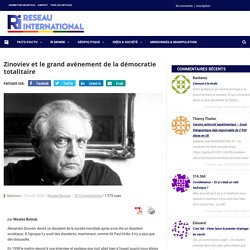
Alexandre Zinoviev devint un dissident de la société mondiale après avoir été un dissident soviétique. À l’époque il y avait des dissidents, maintenant, comme dit Paul Virilio, il n’y a plus que des dissuadés. Michael Polanyi Wikipedia. [DA LEGGERE] Mistica cabalistica e sovversione nell’ opera di Elia Benamozegh. Aristotele su proverbi e senso comune. The Good, the Highest Good, and the Common Good – The Josias. The following thirty-seven theses give a basic overview of the Aristotelian-Thomist account of the good, as interpreted by Laval School Thomists such as Charles De Koninck, Duane Berquist, and Marcus Berquist. A printable version can be found here. A Spanish version can be found here, and a German version here. Foucault’s Principalities & Powers by Angela Franks. In the late 1960s, a sociologist described French theorist Michel Foucault (1926–1984) as “a sort of frail, gnarled samurai who was dry and hieratic, who had the eyebrows of an albino and a somewhat sulfurous charm, and whose avid and affable curiosity intrigued everyone.”
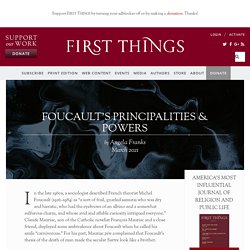
Claude Mauriac, son of the Catholic novelist François Mauriac and a close friend, displayed some ambivalence about Foucault when he called his smile “carnivorous.” For his part, Mauriac père complained that Foucault’s thesis of the death of man made the secular Sartre look like a brother. These comments were made in the 1960s, around the time when Foucault, in his forties, had begun to shave his head, adding to his immediately recognizable radical chic.
Padre Waldstein - What is integralism today? In the Catholic Church old debates that might seem to have been left behind are constantly returning.
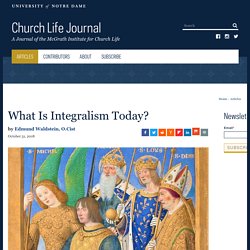
Thus, the debate in the nineteenth and early twentieth centuries between “liberal” Catholics and their opponents, sometimes called “integralists,” has recently given signs of revival. One such sign is a seminar offered this semester at Harvard Law School entitled “Law and Catholic Thought: Liberalism and Integralism.” The seminar’s co-teachers can be seen as representing liberalism (Princeton University’s Professor Robert P. George) and integralism (Harvard’s own Professor Adrian Vermeule) respectively. George is certainly not a “liberal” Catholic in the sense in which that term is opposed to “conservative”—he is indeed one of the standard bearers of conservatism in the American Catholic Church. One way of seeing the debate between Catholic liberalism and integralism is as an argument over the proper response of the Church to the secularization of the modern world.
Conceptual overreach threatens the quality of public reason. Lanostrastoria.corriere. Theology VII: Morals, Introduction and Summa Theologiae Ia-Iae q1-q29 : Duane H. Berquist, PhD : Free Download, Borrow, and Streaming. Counterculture Conservatism. How to revive the flagging fortunes of the Republican Party might matter to some people, but it’s not a question that should concern principled conservatives.
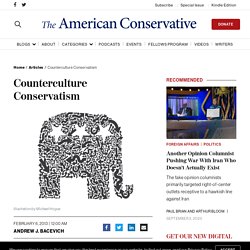
Crypto-conservatives aplenty stand ready to shoulder that demeaning task. Tune in Fox News or pick up the latest issue of National Review or the Weekly Standard and you’ll find them, yelping, whining, and fingering our recently reelected president as the Antichrist. Conservatives who prefer thinking to venting—those confident that a republic able to survive eight years of George W. Bush can probably survive eight years of Barack Obama—confront a question of a different order. To wit: does authentic American conservatism retain any political viability in this country in the present age? Unsustainable Liberalism by Patrick J. Deneen. “Unsustainable Liberalism” is one of three addresses given to a symposium on “After Liberalism,” put on in late February with the support of the Simon/Hertog Fund for Policy Analysis and of Fieldstead and Company.
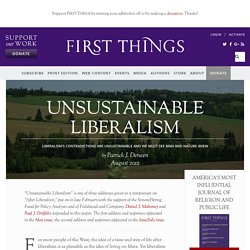
Daniel J. Mahoney and Paul J. Griffiths responded to this paper. The first address and responses appeared in the May issue; the second address and responses appeared in the June/July issue. Josè Ortega y Gasset: le masse, la libertà e la circostanza. “Fratelli tutti”, la fraternità cattolica e l’inclusione liquida. Liberalism’s Fear – The Josias. A Christian Strategy by Adrian Vermeule. Il cosmismo russo. Facciamo un esercizio estremo di Storia alternativa: quale carattere avrebbe assunto la Rivoluzione Russa del 1917 con Aleksandr Bogdanov al posto di Lenin come capo dei Bolscevichi?

Quale destino allora, con Sovietici alternativi al potere, per la Russia e per l’Europa intera? Ipotesi improbabile, ma ci permette d’immaginare un altro Bolscevismo, non necessariamente migliore ma più in sintonia con secoli di spiritualità slava. Autorita e Katechon La genesi teologico. Così la nuova aristocrazia si impossessa del potere, svuotando la politica e annullando la democrazia. 13Dic.
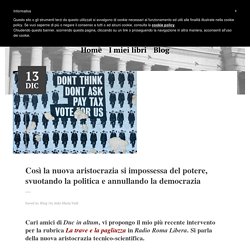
L’Ambientalismo Come Religione. Ma come Falsa Religione. E i Loro Profeti… What Abortion Means — NEWPOLITY. Sure, as the 5-4 decision to strike down a Louisiana regulation of “abortion clinics” sinks in, there are calls to be as energetic, as passionate as before.
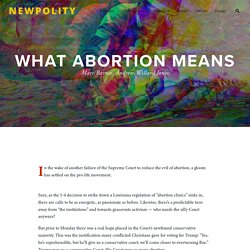
Likewise, there’s a predictable turn away from “the institutions” and towards grassroots activism — who needs the silly Court anyways? But prior to Monday there was a real hope placed in the Court’s newfound conservative majority. This was the justification many conflicted Christians gave for voting for Trump: “Yes, he’s reprehensible, but he’ll give us a conservative court; we’ll come closer to overturning Roe.” Trump gave us a conservative Court. His Court gave us more abortion. It has become fashionable to blame this failure on a legal methodology that values the precedent of past cases over justice; the interpretation of the original intent of the framers of the Constitution over an actual discernment of the common good of our country. The Only Great Reset. You may have heard an ominous phrase echo around the digital ether recently: “The Great Reset.”
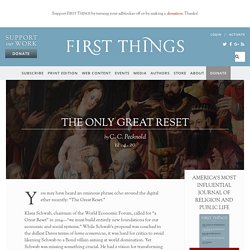
Klaus Schwab, chairman of the World Economic Forum, called for “a Great Reset” in 2014—“we must build entirely new foundations for our economic and social systems.” While Schwab’s proposal was couched in the dullest Davos terms of homo economicus, it was hard for critics to avoid likening Schwab to a Bond villain aiming at world domination. Yet Schwab was missing something crucial. He had a vision for transforming every industry, society, and nation. Dire che Negazionismo è una malattia mentale, è un disturbo del pensiero. Di Enzo Pennetta. Le oscure convergenze tra lo scientismo prometeico e il paganesimo occultista. L’uomo, per sua natura, è un ricercatore e un inventore. Dalle sue scoperte, se non custodisce la consapevolezza che ogni sua facoltà e relativi frutti discende dall’immagine e somiglianza col suo Creatore, scaturisce l’orgoglio ottimistico che mette insieme l’Homo faber e l’Homo sapiens.